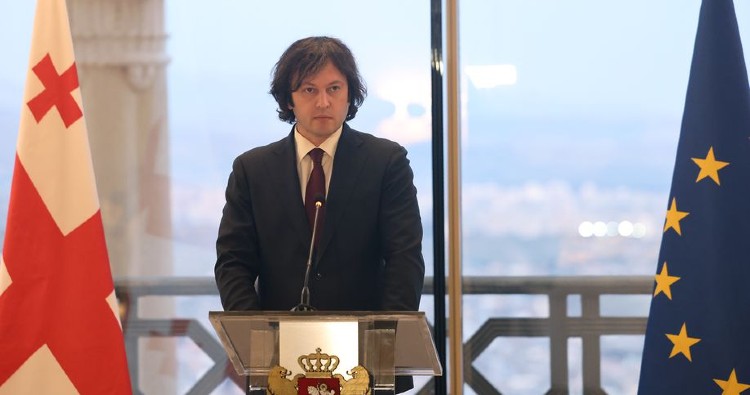“European mindset” is transparency, accountability towards society - Georgian PM on transparency bill

Kobakhidze noted the above-mentioned actions of the NGOs reflected on them having “least credibility” among the state and social institutions in Georgia, which itself damaged the reputation of their donors as well. “I believe that the Law on the Transparency of Foreign Influence will significantly contribute to overcoming this malpractice”, he added. Photo via Government Administration
The “European mindset” is transparency and accountability towards the society, and the Georgian Government has already introduced the European standard of transparency, Prime Minister Irakli Kobakhidze said on Wednesday and noted “now it’s time” for non-governmental organisations and their donors to “get Europeanised” and the Law on the Transparency of Foreign Influence “will definitely and significantly” facilitate it.
The PM’s statement followed a decision of the parliamentary majority to resubmit the bill on the transparency of foreign influence to the Parliament - which calls for the registration of non-commercial legal entities and media outlets in the country as “agents of foreign influence” if they derive more than 20 percent of their funding from abroad - after it was retracted last year following the public protests.
One of the first decisions made as the PM of Georgia was related to the transparency of the Government and its operation. We made principle steps from the very first day and have been making every Government Decree publicly available in the most efficient manner ever since”, Kobakhidze stressed, adding he had “urged” all ministers and management of public institutions “to leave no request for public information without a timely response”.
He also emphasised the information on revenues and expenditures of the State Budget was “fully transparent” and said “it is not surprising” that Georgia was ranked first in the world in the Open Budget Index.
When one is right and has no intention to harm anything, transparency and accountability are the “best way forward to avoid wrongdoing and mistakes”, the Head of the Government noted in his statement and stressed the lack of transparency was “an utterly non-European mindset”, adding not publishing declaration of financial income pointed to “one is harming something and needs to keep it hidden”.
The PM said the transparency law would “effectively indemnify” donors from “a number of inconveniences” related to the “ignition of radicalism and polarisation by NGOs and relevant media outlets that are funded by them in Georgia”, including from encouragement of revolutionary processes, “rigging” the parallel election vote count, war propaganda, disseminating “pseudo-liberal ideology” and from actions directed against the national and religions identity of Georgia, as well as the “attempts to weaken” the public institutions with disinformation.
Kobakhidze noted the above-mentioned actions of the NGOs reflected on them having “least credibility” among the state and social institutions in Georgia, which itself damaged the reputation of their donors as well. “I believe that the Law on the Transparency of Foreign Influence will significantly contribute to overcoming this malpractice”, he added.
The Head of the Government also slammed “un-European forces” in Georgia, who had been lobbying against Georgia’s European Union membership candidate status last year, and stressed the same forces were “trying to convince” the public that “a war is in essence a peace, [and] that regress [of the country] is a progress”, while claiming the lack of transparency is an European way.
The ruling Georgian Dream party earlier today announced that the parliamentary majority would resubmit the bill on the transparency of foreign influence to the Parliament.
The Georgian Parliament last year formally retracted the draft law following the decision by the ruling Georgian Dream party to withdraw the bill, after Georgian-based non-governmental organisations, the United States Department of State, European Union officials and the United Nations Office in Georgia all spoke out in criticism of the bill.
 Tweet
Tweet  Share
Share